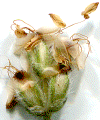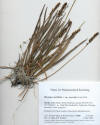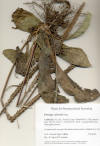|
Plantago erecta |
|
|
Plantago maritima ssp. juncoides |
Plantago ovata |
|
Plantago ovata |
Plantago subnuda
|
|
Plantago subnuda |
|
|
Choi S. Y., S. H. Jung, H. S. Lee, K. W. Park, B. S. Yun and K. W. Lee. 2007. Glycation inhibitory activity and the identification of an active compound in Plantago asiatica extract. Phytother. Res.. Dec “The glycation reaction involves a series of non-enzymatic reactions between the carbonyl group on reducing sugars and the amino group on proteins leading to the formation of advanced glycation end-products (AGEs), which are acknowledged to be involved in the pathogenesis of diabetic and aging-related complications. Consequently, the development of AGE inhibitors is considered to have therapeutic potential in patients with diabetes or age-related diseases. The preliminary results showed that a methanol extract (PAE) of Plantago asiatica, which is traditionally used as a folk medicine in Asian countries to treat fever, cough, wound etc., had strong glycation inhibitory activity. The effects of the extract on AGE fluorescence were dose-dependent, reaching 41% inhibition at 0.1 microg/mL of extract. The purified principle from PAE was identified as plantamajoside. As well as antioxidant activities, in vitro glycation inhibitory activities with 10 and 25 mm plantamajoside were higher than those with 10 and 25 mm aminoguanidine. The results demonstrate that PAE and plantamajoside had significant effects on in vitro AGE formation, and the glycation inhibitory activity and antioxidant activity of plantamajoside were comparable to those obtained using millimolar concentrations of the standard antiglycation agent aminoguanidine, and the antioxidant ascorbate, respectively.” Food and Drug Administration, HHS. 2007. Laxative drug products for over-the-counter human use; psyllium ingredients in granular dosage forms. Final rule. Fed Regist. 72(60):14669–14674. “The Food and Drug Administration (FDA) is issuing a final rule establishing that over-the-counter (OTC) laxative drug products in granular dosage form containing the bulk-forming psyllium ingredients (psyllium (hemicellulose), psyllium hydrophilic mucilloid, psyllium seed, psyllium seed (blond), psyllium seed husks, plantago ovata husks, and plantago seed) are not generally recognized as safe and effective (GRASE) and are misbranded. This final rule includes, but is not limited to, any granules that are swallowed dry prior to drinking liquid; dispersed, suspended, or partially dissolved in liquid prior to swallowing; chewed, partially chewed, or unchewed, and then washed down (or swallowed) with liquid; or sprinkled over food. FDA is issuing this final rule after considering reports of esophageal obstruction associated with the use of psyllium laxatives in granular dosage form. These cases continue to occur despite efforts to promote safe use through label warnings and directions. This final rule does not apply to psyllium laxatives in nongranular dosage forms, such as powders, tablets, or wafers. This final rule is part of FDA's ongoing review of OTC drug products.” Ozaslan M., I. Didem Karagöz, M. E. Kalender, I. H. Kilic, I. Sari and A. Karagöz. 2007. In vivo antitumoral effect of Plantago major L. extract on Balb/C mouse with Ehrlich ascites tumor. Am. J. Chin. Med. 35(5): 841–851. “The aim of this study is to investigate the antitumor activity of Plantago major L. extract in Ehrlich ascites tumor (EAT) bearing Balb/C mice in vivo. Thirty male Balb/C mice were divided into 5 groups: 3 treatment groups and 2 control groups (6 per group). Treatment groups and the negative control group were injected with EAT (1 x 10(6) cells) intraperitoneally to develop ascites tumor. P. major L. extract (1%, 2% and 3% concentration extracts, 0.1 ml/day/mouse) were given p.o. for 10 alternate days. The control group was treated with 0.9% NaCl solution (0.1 ml/day/mouse). The changes of body weight in animals were recorded. On the 11th day, all of the mice were sacrified and their tissues were stained with haematoxylen and eosin for pathological studies. Body weights of in 3 treatment groups and the negative control group were elevated because of tumor burden. The maximal weight gain was recorded in the negative control group and the minimal weight gain was recorded in Group I. Pathological studies showed that P. major L. extract (especially 1% concentration) has inhibitive effect on EAT. P. major has an inhibitory effect on EAT in a dose dependent manner.” Velasco-Lezama R., R. Tapia-Aguilar, R. Román-Ramos, E. Vega-Avila and M. S. Pérez-Gutiérrez . 2006. Effect of Plantago major on cell proliferation in vitro. J Ethnopharmacol. 103(1): 36–42. “Plantago major (Plantaginaceae) is popularly used to treat tumors, infections and as a blood purifier. Aqueous, methanol, chloroform and hexane extracts of the aerial parts (leaves and seeds) were added to CD(1) mice bone marrow and spleen cultures incubated at 37 degrees C for 72h, and also added to Escherichia coli, Bacillus subtilis and Candida albicans cultures, while methanol extract dilutions were added to HTC-15, OVCAR, UISO and KB cell line cultures. Doses of 0.4 and 0.2 mg/mL of aqueous and methanol extracts increased the bone marrow cell concentration by 2.70- and 3.15-fold, respectively, and increased the spleen cell concentration by 3.38- and 6.39-fold, respectively (p < 0.001). Aqueous extract inhibited Bacillus subtilis growth from 78 to 21%; hexane extract inhibited the growth of Escherichia coli, and methanol and chloroform extracts weakly inhibited the growth of Bacillus subtilis and Escherichia coli, respectively. Methanol extract (1 microg/mL) decreased the UISO and OVCAR cell concentrations to 59 and 82%, respectively. Data demonstrate for the first time that Plantago major has hematopoietic activity in vitro.”
|
|









